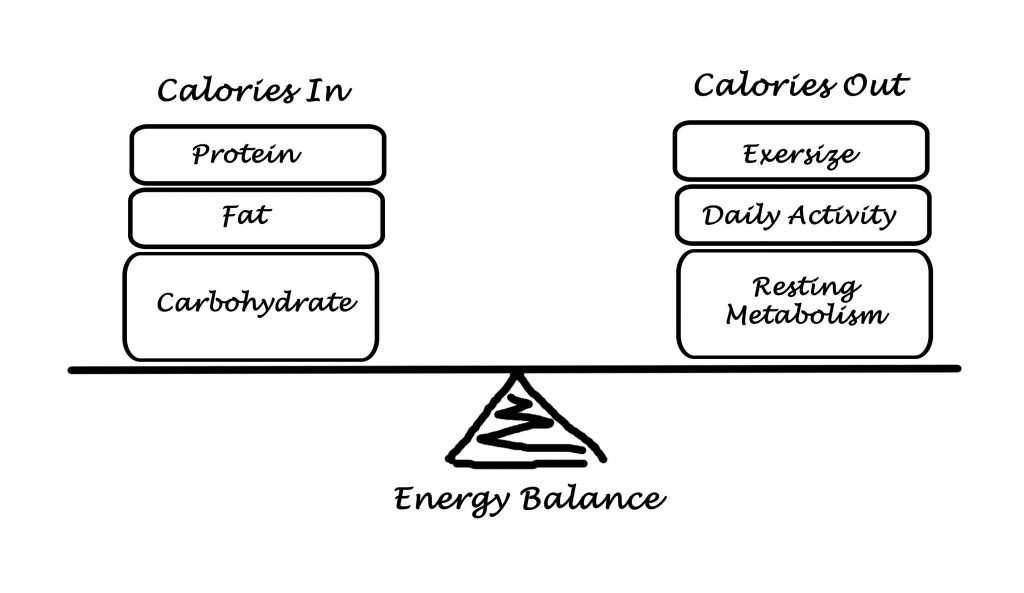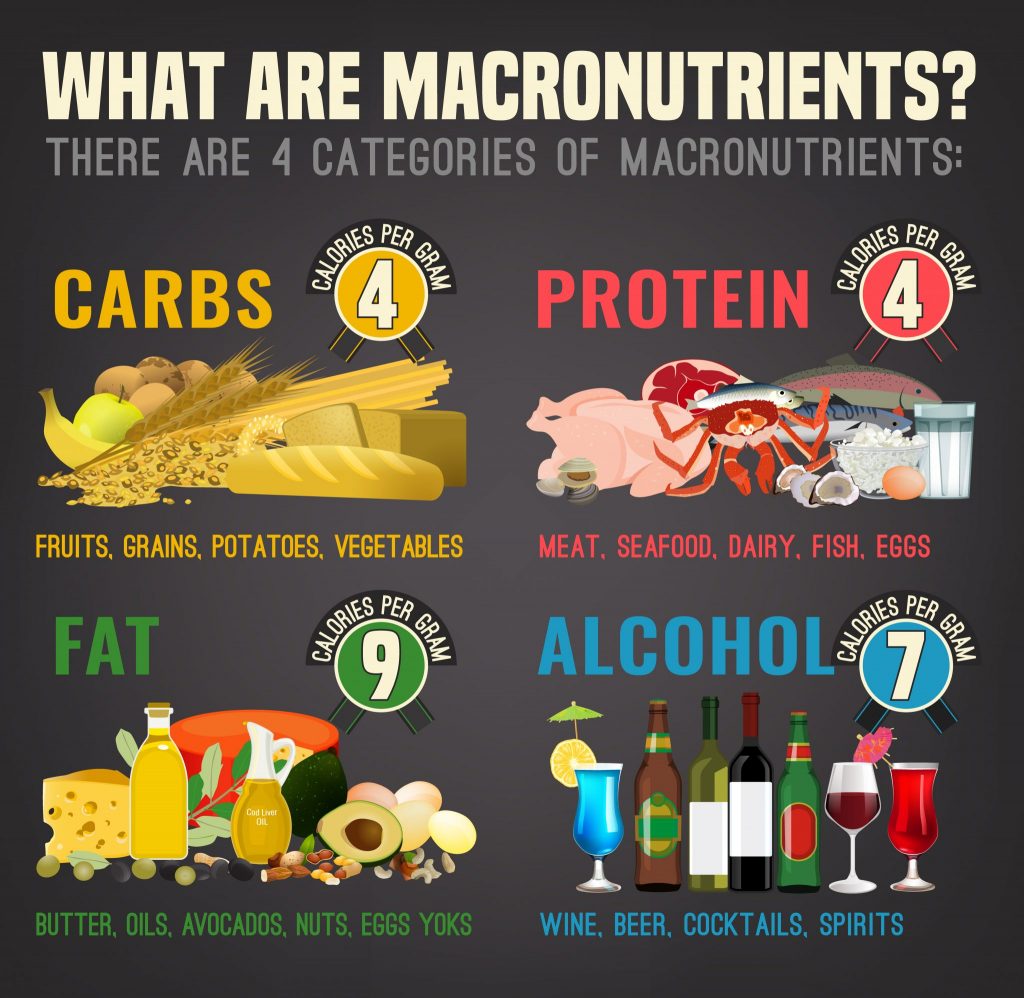WHAT ARE CALORIES?
A calorie is a measure of energy expenditure and stored energy. The calories referred to in diet (food) and exercise (activity) are actually kilocalories (kcal), but for simplicity broadly called just calories.
ENERGY INPUT – The number of calories you consume in the form of food and beverages.
ENERGY OUTPUT – The number of calories you expend by daily movement and exercise.

The most important numbers of your diet are Calories IN and Calories OUT. When you understand how to manage and control energy balance, you’re in charge of achieving and sustaining your fitness goals.
WHAT IS ENERGY BALANCE?
Energy balance is the difference between your energy input, the number of calories that you put into your body and your energy output, or the number of calories you utilise each day.
It’s all regulated by our metabolism. The metabolism, by definition, is the organic and chemical processes inside the body that are necessary to maintain life. It is also responsible for maintaining a balance between constructive metabolism (anabolism) and destructive metabolism (catabolism).
CONSTRUCTIVE METABOLISM – ANABOLISM
…occurs when calories from food are in abundance – hypercaloric state. The essential environment for muscle building if combined with resistance training. Too many calories present in the diet without adequate movement and exercise results in energy being stored for later use in the form of sugar in the muscles and liver (glycogen), and adipose tissue (body fat).
DESTRUCTIVE METABOLISM – CATABOLISM
…is the necessary environment for fat loss occurring once energy intake is lower than output – hypocaloric state. We have to consider if we stay in this state for too long, our body goes through a series of necessary metabolic adaptations to ensure overall survival in such a state.
Our body undertakes trade-offs in both states. Too long in a hypercaloric state, and body will end up storing energy in the form of body fat. Too long in a hypocaloric state and body will start utilizing muscle protein for energy use, which results in a loss of precious muscle mass.
Calories come from the macronutrients protein, fat, carbohydrates, and alcohol.

WHAT YOU SHOULD REMEMBER:
NOT ALL CALORIES ARE THE SAME
You’ve heard about empty calories, meals and drinks providing very little or no nutritional value. Can of coke and a handful of almonds contain about the same amount of calories, but while coke is pure sugar, and has an impact on insulin and other hormones. Almonds contain healthy unsaturated fat, 6 grams of protein, calcium other body-profitable elements.
It’s noteworthy that that different foods and macronutrients have a significant effect on the hormones and brain centres that control hunger and eating behaviour. Quality of food always matter.
CALORIES ARE EVERYWHERE
Except for water, and not so healthy diet drinks, calories are pretty much everywhere. When recording their food log, my clients often don’t consider calories from the oil they use for cooking, sauces, milk or cream in their coffee. Add frequently overlooked mindless snacking, and reasonably it makes more sense now why despite eating healthy, your body weight remains the same, or over months and years goes up.
YOUR BRAIN, BODY AND CALORIES
The brain uses glucose as it’s the primary fuel for processing and transmitting information through an electrical signal. The brain requires about 20% of daily energy intake, and the foods we consume considerably affect brain function, everything from learning and memory to emotions. Have you ever been hangry?
The body needs calories to perform basic, life-sustaining functions even when at rest. Some of them are blood circulation, breathing, cell production, nutrient processing, protein synthesis, and ion transport. This is called the Basal Metabolic Rate (BMR)
Combination of quality and quantity of calories you consume determines how your body function and looks.
CALORIES TRACKING IS NOT 100% ACCURATE
It can’t be because there are too many variables to be considered when tracking food. Food labelling, which isn’t always reliable. The food labels also evoke a specific set of beliefs. Alia Crum’s milkshake study explains the importance of mindset and level of ghrelin (the hunger hormone) towards the food we eat. I find it very interesting and thought provoking.
Our beliefs matter in virtually every domain, in everything we do. Crum says. “How much is a mystery, but I don’t think we’ve given enough credit to the role of our beliefs in determining our physiology, our reality. We have this elementary metabolic science: calories in, calories out. People don’t want to think that our beliefs have influence, too, she says. But they do!”
There more elements what we need to oconsider when counting calories:
- Our body uses energy to digest food known as the thermic effect of food, which also is more of estimation rather than accurate calculation. Protein takes up the most, about 30% of calories consumed from protein goes towards digestion, absorption, and disposal of ingested nutrients.
- Oral and gut bacteria also take a bite from food we eat, hence why good gut health is very significant.
- The properties of different foods themselves that speed up or slow down their journey through the intestines, such as whether they are cooked or resistant to digestion.
This all should be considered.
WHY DO WE TRACK CALORIES?
“The process used to estimate calories for food was developed at the turn of the 19th to 20th century by Wilbur Atwater. Although it has been useful for approximating the energetic costs of metabolizing many foods, its shortcomings have been known for decades—and some nations, such as Australia, have dropped the system because it is “inaccurate and impractical,” said panelist Geoffrey Livesey, a nutritional biochemist and director of Independent Nutrition Logic Ltd. in Wymondham, U.K.”
Nevertheless, I still believe calorie counting is a useful tool for anyone who wants to learn about their energy balance and eating habits.
To my best knowledge, the following factors play a role when it comes to calories consumption:
Microbial activity, genetics, quality of food, macronutrient ratio, eating pace, the body’s energy status, and even our thoughts towards food play an essential role in the calorie content we consume.
I’m aware I could have missed some too as the science is progressing every day. I believe one we all will have a better understanding of what’s the best sustainable nutritional strategy for us as unique individuals.
REFFERECNES:
https://www.ncbi.nlm.nih.gov/pmc/articles/PMC506782/
https://www.brainfacts.org/ask-an-expert/how-does-the-brain-use-food-as-energy
https://www.sciencemag.org/news/2013/02/have-we-been-miscounting-calories
https://www.npr.org/sections/health-shots/2014/04/14/299179468/mind-over-milkshake-how-your-thoughts-fool-your-stomach?t=1566143703373
https://www.ncbi.nlm.nih.gov/pubmed/?term=crum+ghrelin
http://slimnow.co.ke/3-ways-to-lose-weight-with-energy/http://www.weight-loss-professional.com/healthy-diet/
https://www.sciencemag.org/news/2013/02/have-we-been-miscounting-calories
https://www.verywellfit.com/what-is-a-calorie-3432508








